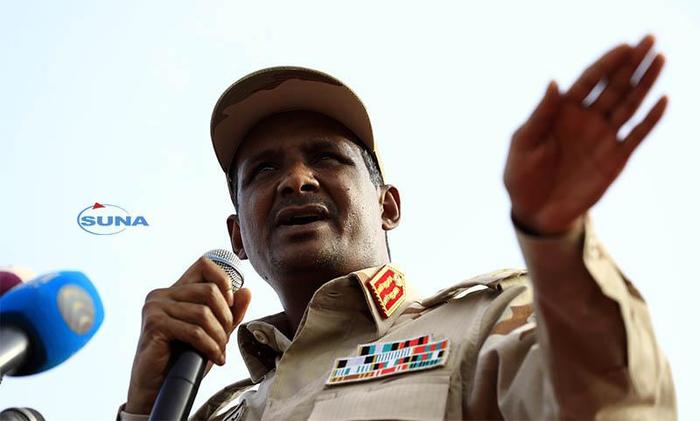Beijing-brokered Iran-Saudi peace lauded by Sudan’s Hemeti

Hemeti during a speech in 2019 in which he said that the RSF is not guilty of June 3 Massacre (File photo: SUNA)
KHARTOUM –
Sudan’s Vice Chairman of the Sovereignty Council and Commander of the Rapid Support Forces (RSF), Lt Gen Mohamed Hamdan ‘Hemeti’, welcomed the resumption of diplomatic relations between the Islamic Republic of Iran and Saudi Arabia, following the four-day-negotiation brokered by Chinese officials in Beijing on Friday.
In a tweet posted on Friday, the RSF leader lauded the China-brokered deal as a “step that will contribute to strengthening stability and ensuring a more peaceful and prosperous future for the region”. The Vice President also reserved praise for China’s role in restoring diplomatic ties between the two counties.
Sudan’s Ministry of Foreign Affairs also welcomed the bilateral alliance in a press statement on Friday. The ministry considered the renewal of diplomatic ties as encompassing the “principle of direct dialogue”, as well as consolidating “the concept of good neighbourliness”.
The ministry’s statement went on to celebrate China’s efforts in mediating and contributing to the “inevitable positive effects that will be seen in the overall regional situation”.
UN sanctions
Sudan’s support of the China-brokered deal comes days after the UN Security Council’s Chinese representative, Dai Bing, abstained from voting on extending the mandate of sanctions for Sudan.
The United Nations Security Council convened in New York on Wednesday, voting to extend Sudan’s imposed sanctions for an additional year. The sanctions, which broadly cover an arms-embargo, are targeted sanctions to improve Sudan’s national peace-building capacity.
Following the 13-member state majority vote in favour of extending sanctions, the Chinese representative stated that their decision only sought to perpetuate the sanctions with “no intention of lifting them”, adding that the “outdated benchmarks” cannot be met.
As well as China, the permanent UN Representative to Russia, Dmitry Polyanskiy, also abstained from extending the mandate, stating that the sanctions served as an impediment to Sudan’s capability in “state-building and achieving socioeconomic development”.











 and then
and then